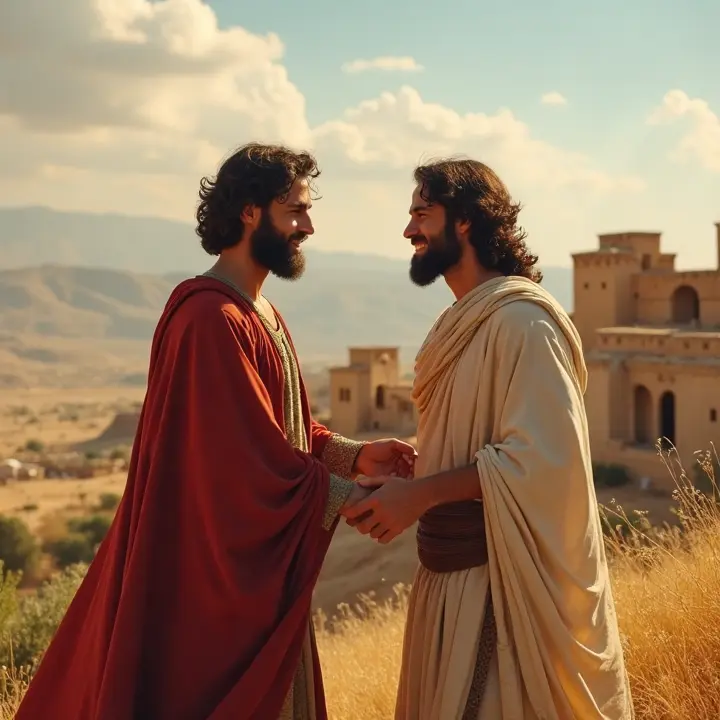In the vast tapestry of biblical narratives, the story of David and Jonathan stands out as one of the most poignant and enduring depictions of friendship and love. Their bond transcends mere camaraderie; it is a profound, selfless, and unwavering connection that has captivated readers for millennia. This narrative, found primarily in the First Book of Samuel, is not just a tale of two men; it is a testament to the power of love in its purest form.
Their story begins in the backdrop of a tumultuous era in Israel’s history. David, a young shepherd boy, is anointed by the prophet Samuel to be the future king of Israel. Meanwhile, Jonathan, the son of King Saul, is the crown prince, destined to inherit his father’s throne. Despite their differing destinies, David and Jonathan’s paths cross in a way that forges an unbreakable bond.
Their first encounter is marked by an instant connection. When David arrives at Saul’s court, having been summoned to play his harp and soothe the king’s troubled spirit, Jonathan is immediately drawn to him. The Bible describes their meeting with a powerful simplicity: “The soul of Jonathan was knit to the soul of David, and Jonathan loved him as his own soul” (1 Samuel 18:1). This verse captures the essence of their relationship¡ªit was not a friendship born out of convenience or mutual benefit, but a deep, spiritual connection that resonated at the core of their beings.
As David’s fame and favor with the people of Israel grow, so does Saul’s jealousy and animosity towards him. The king’s paranoia leads him to pursue David with the intent to kill him, viewing him as a threat to his own rule. In this dangerous and uncertain environment, Jonathan’s loyalty to David is put to the ultimate test. Yet, his love for David remains unwavering. He repeatedly warns David of his father’s schemes, risking his own safety and position to protect his friend.
One of the most dramatic and heart-wrenching moments in their story occurs when Jonathan and David meet in the field to discuss Saul’s intentions. Jonathan, knowing the peril David faces, devises a plan to discern his father’s true feelings. He shoots arrows and uses a prearranged signal to inform David whether it is safe to return or if he must flee. The Bible recounts this poignant scene: “And Jonathan cried after the boy, ‘Make haste, haste, stay not!’ So David fled, and escaped, and went to the place where Jonathan had appointed him” (1 Samuel 20:36-42). This moment encapsulates the depth of their love¡ªJonathan is willing to sacrifice everything, even his own claim to the throne, for David’s safety.
Their friendship is also marked by a beautiful exchange of gifts. Jonathan gives David his robe, his sword, and his bow, symbolic gestures of his willingness to relinquish his own rights and privileges for David’s sake. These gifts are not merely tokens of affection; they represent Jonathan’s recognition of David’s true destiny and his selfless desire to support him. In return, David’s love for Jonathan is equally profound. He mourns Jonathan’s death deeply, lamenting in a heartfelt elegy: “I am distressed for you, my brother Jonathan; very pleasant hast thou been unto me: thy love to me was wonderful, passing the love of women” (2 Samuel 1:26).
The love between David and Jonathan is often described as “passing the love of women.” This phrase has sparked much debate and interpretation over the centuries. Some view it as a testament to the extraordinary depth of their platonic friendship, a bond so strong that it surpasses even the most intimate of human relationships. Others suggest that their love may have transcended traditional boundaries, hinting at a romantic connection. Regardless of the interpretation, what remains undeniable is the purity and intensity of their love. It is a love that is selfless, sacrificial, and unwavering, rooted in mutual respect, admiration, and a shared commitment to one another.
In the broader context of the Bible, the story of David and Jonathan serves as a powerful reminder of the transformative power of love. Their relationship challenges conventional notions of loyalty, duty, and destiny. It shows that true love is not bound by social status, family obligations, or even personal ambitions. Instead, it is a force that compels individuals to act with courage, integrity, and selflessness.
In a world often marred by conflict, betrayal, and self-interest, the story of David and Jonathan shines as a beacon of hope and inspiration. Their love story, woven into the fabric of sacred scripture, invites us to reflect on the true meaning of friendship and love. It encourages us to seek connections that transcend superficiality and to cultivate relationships marked by authenticity, sacrifice, and enduring commitment. David and Jonathan’s story is not just a chapter in the Bible; it is a timeless testament to the enduring power of love in all its forms.

